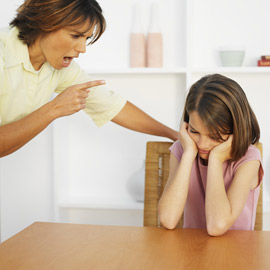How to talk to your kids (and things you should never say!)
I once knew a person that would tell people (in front of her kids) – “I like my kids until they are 13 – then I hate them. This one is still my favorite – because she’s still 12 – but not for long!” ??? What?!!! (And people wonder why they have relationship issues with their kids). I’m often surprised at what some people say to and in front of their kids.
Each child is so different – and there are things you can say to each of your kids – and it would affect each of them differently – based upon their own personality makeup, their history and experiences, etc.
But here are some good general basic rules/suggestions for what to say and what not to say to your kids.
Imparting a Healthy Dose of Shame
One of the main things that should be avoided when speaking to your kids – is never to shame them. People have said “I’m just imparting a healthy dose of shame” – to make them feel bad for what they did, so they will change their ways.
There is NO healthy dose of shame! It’s like saying you are giving them “a healthy dose of poison”. Shame destroys, not builds up. Shame speaks to and about their identity – not the action.
Guilt is a “wrongness of action” – but Shame is a “wrongness of being“. It says “I am uniquely and hopelessly flawed.” Anything that is being said negatively about the person’s identity – who they are – even if it looks like you are talking about their behavior and not trying to shame them- can be very harmful. So be careful to not impart guilt and shame.
If they have done something they know is wrong – they know they are guilty. If they didn’t know they did something wrong, and you shame them – you have really opened a door for some lies about their identity to enter in. Remember – kids . . . are kids! Look at the behavior and realize – is it just childlike/childish behavior or was it disobedience? Either way – keep shame and guilt out of your vocabulary and reactions.
Infinite words – Always & Never – And Should/n’t
Statements that include the words “always, never, I can’t believe, how could you, you should or shouldn’t” etc. – will most likely cause harm to one degree or another.
Even if you are saying things about your kids when they are young, and you don’t think they even understand what you are saying- they will pick up on it (whether the words, tone or actions). I had one friend that was constantly talking about their son – and how “he’s a handful! He’s going to keep us running. I don’t know what to do with him. We call him a little terror.” etc. That will truly be what happens – and it will affect that child’s life negatively. There truly is power in the words we speak . . . bringing life or death into our lives and the lives of our kids in various ways.
Many people have tried telling me that my daughter is a “handful”. In the beginning I agreed – “She’s a strong-willed child”. But when she was around 4 or 5 (and after years of struggling to truly bond and get along with her in many ways) I changed my terminology and looked at what people thought of as a negative – and turned it into a positive. She is a “strong-willed” because she was born a leader – and her little self knew it – even as a toddler! So – instead I would say “You’re my little CEO in the making! You are such a leader!” – and I would tell others that too.
Find the Good/Positive – & Declare it!
Bottom line . . . keep your comments positive & full of love – find the positive in the negative. Declare the good, not point out the bad. My oldest son had the best teacher ever. When he would mess up or not do as well with some of his work – we never heard – “What happened Tyler? I can’t believe you did this bad.” etc. Instead we heard “Well, you got a D . . . not your best – but you are such a fabulous writer – so I know your next grade will be much better!” Wow! No shame – but a building up and motivation to actually be better the next time – and that he can do it!
How to talk to your kids
This is not an exhaustive list – but a few things to get you started.
- Build up – don’t tear down.
- Avoid “always” and “never” statements. Just don’t use them (“Never” use them! hee,hee)
- Avoid “should” statements – as it says to your child that they are not what they “should” be (or doing what they should) – meaning there is something wrong with them.
- Declare the good – the positive – the “gold” or “gem” that is inside each of your kids – to them, in front of them and to others. Don’t focus on the negative and what they are doing wrong.
- Avoid negative identity statements – “You’ll never . . . you always . . . you are . . . you should’ve . . .”
- Avoid things that do not promote, encourage and foster significance, belonging and being loved (the 3 things we all long for!).
- Avoid – blame and shame. Accept responsibility for your reactions, actions, feelings, emotions, etc – especially as it relates to your children’s actions, reactions, etc. They are not responsible for you and your feelings, emotional well being, etc. You are the parent – and you are in control of and responsible for you.
You have Treasures in your House!
Your kids are precious. They are unique. They are gems. They are not you, not like you, and will not be like you.
Treasure and enjoy their differences, their different opinions, likes, desires, actions, attitudes, etc. Nourish, enjoy, pour into them and “call out the gold” in each of them!



